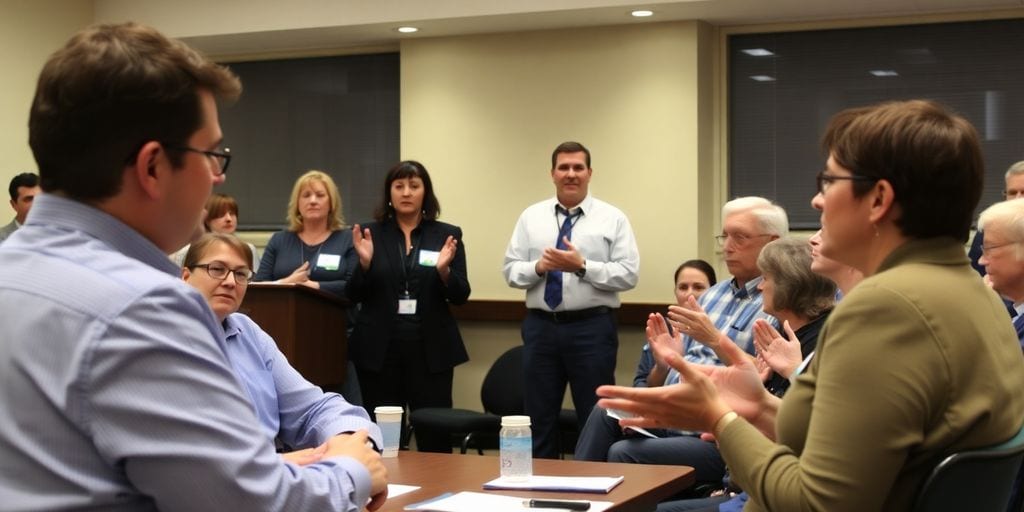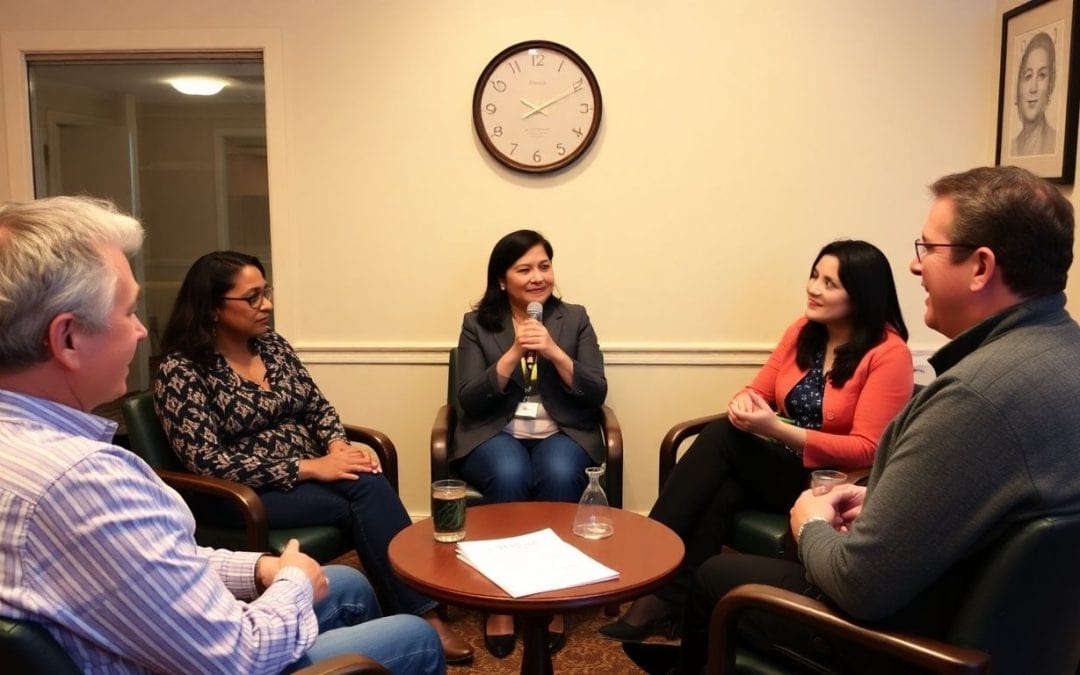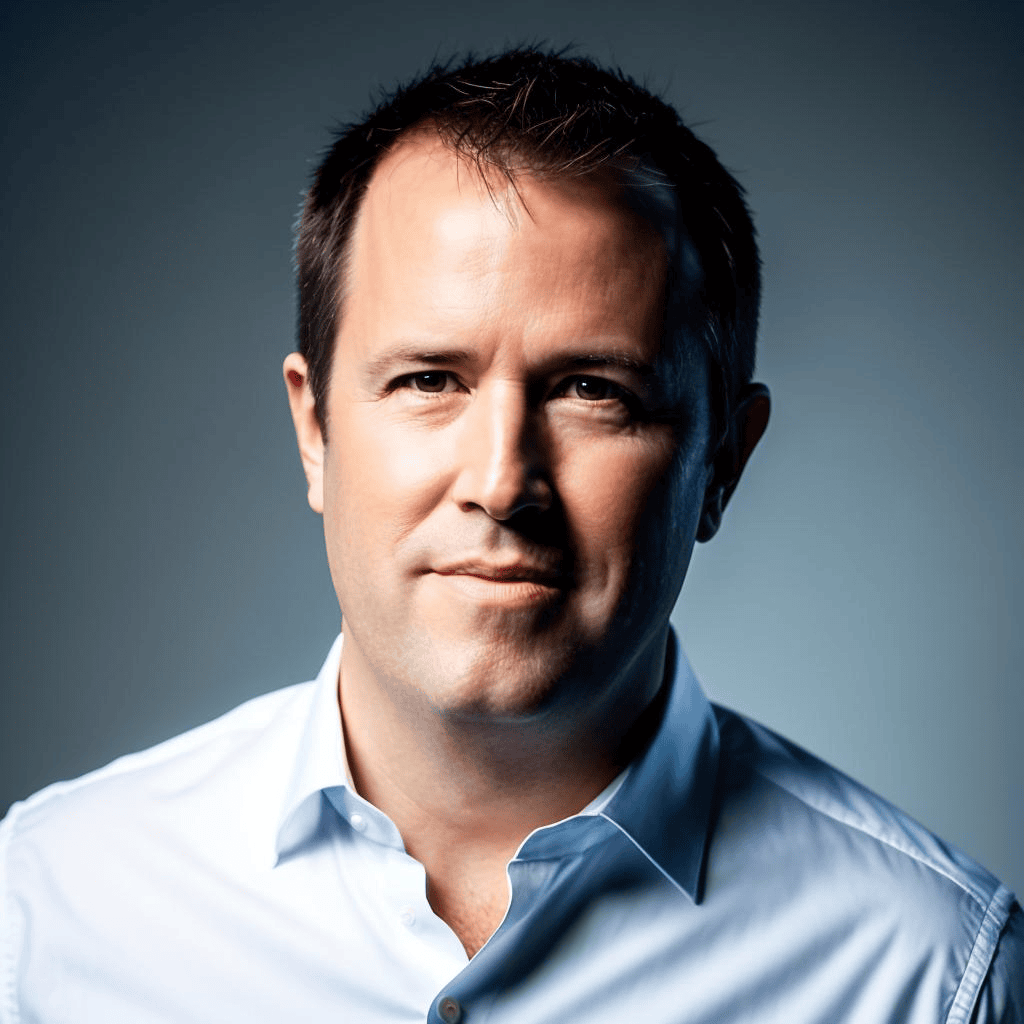Toastmasters is a global organization that helps people improve their public speaking and leadership skills. Founded nearly a century ago, it has transformed the lives of millions by providing a supportive environment where individuals can practice and refine their communication abilities. Whether you’re a novice speaker or someone looking to polish your presentation skills, Toastmasters offers a unique opportunity to grow in confidence and effectiveness. This article explores what Toastmasters is all about and how it can help you become a more confident speaker.
Key Takeaways
Toastmasters is an organization focused on improving public speaking and leadership skills.
Members practice regularly in a supportive environment, helping to build confidence.
The structure of meetings allows for both prepared speeches and spontaneous speaking opportunities.
Feedback from peers is a crucial part of the learning process in Toastmasters.
Participating in Toastmasters can lead to personal growth and enhanced career prospects.
Understanding The Toastmasters Experience
What Is Toastmasters?
Okay, so what is Toastmasters, really? It’s not just about standing up and talking; it’s a journey. Think of it as a gym for your voice and mind. You go there to build communication muscles you didn’t even know you had. It’s a place where stumbling over words is totally okay, because that’s how you learn to dance with them instead. It’s a supportive environment designed to help you become a more confident speaker and leader.
The History Behind Toastmasters
It all started way back when, almost a century ago. A single guy realized a bunch of people needed help speaking in public. So, he started a club. Now, fast forward to today, and it’s a global network. It’s pretty cool to think about how something so simple turned into this massive thing that’s helped millions. It’s a testament to the fact that everyone, everywhere, can benefit from public speaking practice.
How Toastmasters Works
So, how does this whole thing actually work? Well, you join a club, and then you show up. Seriously, that’s the first step. Meetings are structured, but not scary. You’ll get chances to speak, give feedback, and even lead. The best part? You’re surrounded by people who are all there for the same reason: to get better. It’s like having a team of cheerleaders who also give you honest advice.
Toastmasters isn’t just about learning to speak; it’s about learning to connect. It’s about finding your voice and using it to make a difference, whether that’s in a boardroom, at a wedding, or in your community. It’s about personal growth, plain and simple.
Building Confidence Through Practice

The Importance Of Regular Practice
Okay, so you want to be a confident speaker? It’s not magic; it’s more like learning to ride a bike. You wouldn’t expect to nail it on your first try, right? Public speaking is the same. Regular practice is the bedrock of confidence. The more you do it, the less scary it becomes. Think of it as building a muscle. Each speech, each presentation, each little chat in front of a group strengthens your ability to handle the next one.
Start small: practice in front of a mirror.
Record yourself: cringe, learn, improve.
Find a buddy: get honest feedback.
Consistent effort is what separates the good from the great. It’s about showing up, even when you don’t feel like it, and pushing yourself to improve just a little bit each time. That’s how you build real, lasting confidence.
Overcoming Public Speaking Anxiety
Let’s be real: public speaking anxiety is a beast. Butterflies? More like a swarm of angry wasps. But here’s the thing: everyone feels it to some extent. Even seasoned speakers get nervous. The trick is not to eliminate the anxiety (good luck with that!), but to manage it. Understand that it’s your body’s way of preparing you. Reframe it as excitement, not fear.
Deep breathing exercises: calm those nerves.
Visualize success: see yourself nailing it.
Challenge negative thoughts: replace them with positive affirmations.
Toastmasters can help you with speaking anxiety.
Creating A Safe Learning Environment
One of the best things about Toastmasters is that it’s a safe space to mess up. Seriously. It’s a supportive environment where you can experiment, try new things, and bomb without judgment. This is huge for building confidence. You need to know that it’s okay to not be perfect. In fact, it’s expected. That’s how you learn.
Embrace vulnerability: it’s okay to be imperfect.
Focus on growth: celebrate small victories.
Support your peers: give and receive constructive feedback.
Feature | Benefit |
|---|---|
Supportive peers | Encouragement and constructive criticism |
|
No judgment |
Freedom to experiment and learn |
|
Regular practice |
Gradual improvement and confidence |
The Structure Of Toastmasters Meetings
Toastmasters meetings are designed to be both structured and supportive, providing a consistent framework for members to practice and improve their communication and leadership skills. Let’s break down what you can expect.
Typical Meeting Format
So, what does a typical Toastmasters meeting look like? Well, it’s usually around one to two hours long and divided into segments. The meeting usually starts with a formal opening, followed by prepared speeches, impromptu speaking (Table Topics), and evaluations. Each segment is timed to keep things moving and give everyone a chance to participate. It’s a well-oiled machine designed for maximum growth.
Here’s a rough breakdown:
Opening (5-10 minutes): The Toastmaster introduces the meeting and any guests.
Prepared Speeches (30-45 minutes): Members deliver speeches based on projects from the Pathways learning program.
Table Topics (15-20 minutes): Impromptu speaking session where members speak for 1-2 minutes on a topic they receive on the spot.
Evaluations (20-30 minutes): Constructive feedback is provided for each prepared speech and the overall meeting.
Closing (5 minutes): The Toastmaster wraps up the meeting and makes announcements.
Roles Within The Meeting
To keep things running smoothly, each meeting has several key roles. These roles give members opportunities to practice different skills and contribute to the club’s success. Taking on different roles is a great way to step outside your comfort zone.
Some common roles include:
Toastmaster: The emcee of the meeting, responsible for keeping the meeting on track and introducing speakers.
Speaker: Delivers a prepared speech based on a project from the Pathways learning program.
Table Topics Master: Facilitates the impromptu speaking session.
Evaluator: Provides feedback on prepared speeches.
Grammarian: Observes language usage and provides feedback on grammar and word choice.
Ah-Counter: Tracks filler words (like “um,” “ah,” and “you know”) used during the meeting.
Timer: Monitors the time for each segment and speaker.
Feedback Mechanisms
Feedback is the heart of Toastmasters. It’s how we learn and grow. After each prepared speech, an evaluator provides constructive criticism, highlighting strengths and areas for improvement. This feedback is always delivered in a supportive and encouraging manner. You’ll also receive written feedback from other members.
Toastmasters isn’t just about public speaking; it’s about personal growth. The structured meetings, diverse roles, and emphasis on feedback create an environment where you can safely experiment, learn from your mistakes, and celebrate your successes. It’s a journey, not a destination, and every meeting is a step forward.
Developing Effective Communication Skills
Crafting Your Message
Think of your message as the blueprint for a building. You wouldn’t start construction without a detailed plan, right? Same goes for communication. Before you even open your mouth, know exactly what you want to say and, more importantly, why you’re saying it. What’s the core idea? What action do you want your audience to take? Clarity is king. A confused audience is a lost audience.
Define your objective: What do you want to achieve?
Know your audience: What are their needs and interests?
Structure your thoughts: Use a clear and logical flow.
“Effective communication starts with a clear understanding of your own message. If you don’t know what you’re trying to say, how can you expect anyone else to understand?”
Engaging Your Audience
Nobody wants to listen to a monotone college professor – we’ve all had at least one. Engaging your audience is about making a connection, sparking their interest, and keeping them hooked. It’s about turning passive listeners into active participants. How do you do that? Tell stories. Use humor (appropriately, of course). Ask questions. Make it personal. Remember, people connect with people, not with bullet points.
Use storytelling: Share relatable experiences.
Incorporate humor: Keep it light and relevant.
Ask questions: Encourage interaction and thought.
Using Body Language Effectively
Your body speaks volumes, even when you’re not saying a word. Body language can either amplify your message or completely undermine it. Stand tall, make eye contact, and use gestures to emphasize your points. Avoid fidgeting, slouching, or crossing your arms – these can signal nervousness or disinterest.
|
Body Language Element |
Impact |
|---|---|
|
Eye Contact |
Builds trust and connection |
|
Posture |
Conveys confidence and authority |
|
Gestures |
Emphasizes points and adds dynamism |
|
Facial Expressions |
Reflects emotions and engages the audience |
Here’s a tip: record yourself speaking. It’s painful, but incredibly insightful. You’ll catch all those little nervous habits you didn’t even know you had. Then, you can start working on them. Remember, effective communication isn’t just about what you say, it’s about how you say it. If you want to improve your leadership skills, start with your body language.
The Role Of Feedback In Growth
Feedback is like the secret sauce in the recipe for personal and professional growth. Without it, you’re just guessing, hoping you’re adding the right ingredients in the right amounts. But with it? You’ve got a map, a guide, and a support system all rolled into one. It’s not always easy to hear, but it’s essential for getting better.
Receiving Constructive Criticism
Okay, let’s be real: nobody loves getting criticized. It can sting, especially if you’re putting your heart and soul into something. But here’s the thing: constructive criticism is a gift, even if it doesn’t feel like it at the moment. It’s an opportunity to see yourself through someone else’s eyes, to identify blind spots, and to refine your approach. Think of it as free consulting – someone is taking the time to point out areas where you can improve. Listen actively, ask clarifying questions, and resist the urge to get defensive. Remember, it’s about the work, not about you personally.
Giving Feedback To Others
Giving feedback is an art. It’s not about tearing someone down; it’s about helping them build themselves up. Be specific, focus on behavior rather than personality, and always frame your feedback in a way that’s actionable and encouraging. Start with what they’re doing well, then gently address areas for improvement. And remember, timing is everything. Don’t ambush someone with feedback; find a private, comfortable setting where they’re more likely to be receptive. Think of it as planting seeds – you want to nurture growth, not stomp it out.
The Value Of Peer Support
Toastmasters isn’t just about individual growth; it’s about community. The support you get from your peers is invaluable. They’re in the trenches with you, facing the same challenges, celebrating the same victories. They can offer insights and encouragement that you might not get anywhere else. Plus, giving and receiving feedback within a supportive group creates a safe space to experiment, take risks, and learn from your mistakes. It’s like having a personal cheerleading squad that also happens to be brutally honest when you need it.
Feedback is the breakfast of champions. Seriously, embrace it. Seek it out. Use it to become the best version of yourself. It might be uncomfortable at times, but the rewards are well worth the effort. You’ve got this!
Here’s a quick guide to remember:
Be open to feedback.
Focus on growth, not perfection.
Support your peers.
Practice giving constructive criticism.
Celebrate progress, no matter how small.
And remember, systems thinking can help you understand how feedback loops influence your communication skills.
Leadership Opportunities Within Toastmasters
Toastmasters isn’t just about becoming a better speaker; it’s also a fantastic place to hone your leadership skills. Think of it as a leadership playground, where you can experiment, learn, and grow without the high stakes of the professional world. It’s a chance to step up, take charge, and discover what you’re truly capable of.
Taking On Club Roles
One of the most direct ways to develop leadership skills is by taking on club roles. These roles, such as President, Vice President, Secretary, or Treasurer, offer hands-on experience in managing a team, organizing events, and making important decisions. Each role provides a unique set of challenges and opportunities for growth. It’s like a mini-MBA, but way more fun and with a supportive community cheering you on. You’ll learn how to delegate, motivate, and resolve conflicts – skills that are invaluable in any leadership position.
Leading Meetings
Leading a Toastmasters meeting is a crash course in public speaking and leadership. As the Toastmaster of the Evening, you’re responsible for setting the tone, keeping the meeting on track, and ensuring that everyone has a chance to participate. It’s a chance to practice your facilitation skills, think on your feet, and handle unexpected situations with grace and poise. It’s not always easy, but it’s incredibly rewarding to see a meeting run smoothly under your guidance.
Mentoring New Members
Mentoring new members is a fantastic way to give back to the club and develop your leadership skills. As a mentor, you’ll guide new members through the Toastmasters program, helping them set goals, overcome challenges, and achieve their full potential. It’s a chance to share your knowledge, provide encouragement, and make a real difference in someone’s life. Plus, teaching others is one of the best ways to solidify your own understanding of the principles of effective communication and leadership.
Think of Toastmasters as a leadership laboratory. It’s a place where you can experiment with different leadership styles, make mistakes, and learn from your experiences without fear of judgment. It’s a safe and supportive environment where you can grow into the leader you were always meant to be.
Here’s a quick look at some of the leadership roles and the skills they help you develop:
|
Role |
Key Skills Developed |
|---|---|
|
President |
Strategic planning, team management, decision-making |
|
Vice President |
Membership growth, marketing, public relations |
|
Secretary |
Organization, communication, record-keeping |
|
Treasurer |
Financial management, budgeting, accountability |
|
Sergeant at Arms |
Logistics, event planning, hospitality |
By actively participating in these leadership opportunities, you’ll not only enhance your communication skills but also build a strong foundation for success in all areas of your life. Don’t just be a member; be a leader! Consider attending business leadership conferences to further enhance your skills.
The Pathways Learning Experience

Toastmasters isn’t just about standing at a podium; it’s about growth – growth at work, growth in your overall career, and personal growth. The Pathways learning experience is Toastmasters’ education program. It’s designed to help you develop skills that go way beyond public speaking. Think of it as your personal development toolkit, customized to help you reach your goals.
Overview Of Pathways
Pathways is interactive and flexible. It focuses on five core competencies: Public Speaking, Interpersonal Communication, Strategic Leadership, Management, and Confidence. With eleven different paths to choose from, you can really tailor your learning to what matters most to you. It’s like choosing your own adventure, but with guaranteed skill-building along the way.
Choosing Your Learning Path
Not sure where to start? No problem! Pathways offers an online assessment that helps you figure out which path aligns best with your goals. As a Toastmasters member, you get one path for free when you join. It’s a great way to test the waters and see what resonates with you. Each path has five levels, so you start with the basics and work your way up to expert status. Plus, Pathways is available online or in print, and it’s translated into multiple languages.
Skills Development Through Projects
Pathways isn’t just theory; it’s all about doing. You’ll progress through your chosen path by completing projects, giving presentations at club meetings, and using the feedback you get to improve. It’s all about learning by doing, at your own pace.
Think of Pathways as a structured way to build confidence and competence. It’s not just about giving speeches; it’s about becoming a better communicator, leader, and all-around professional. It’s an investment in yourself that pays dividends in all areas of your life.
Here are some of the skills you can develop through Pathways:
Interview preparation
Project management
Conflict resolution
Online meeting facilitation
Leadership development
Toastmasters For Professional Development
Toastmasters isn’t just about conquering your fear of public speaking; it’s a powerful tool for professional growth. It’s about honing skills that directly translate to career advancement and leadership effectiveness. Forget those expensive seminars – toastmasters international offers a supportive, fun, and affordable way to gain communication skills that can open doors you never thought possible.
Enhancing Career Prospects
Toastmasters provides a unique platform to refine your communication skills, which are essential in any profession. Whether you’re aiming for a promotion, seeking a new job, or simply want to communicate more effectively with your colleagues, the skills you develop in Toastmasters can give you a competitive edge. It’s about building a better version of yourself, one speech at a time. Think of it as an investment in your future, where every meeting is a step closer to your professional goals.
Networking Opportunities
Toastmasters clubs are filled with people from diverse backgrounds and professions. This creates a fantastic environment for networking. You’ll meet people who can offer advice, mentorship, and even job opportunities. It’s not just about what you know, but who you know, and Toastmasters helps you expand your network in a meaningful way. Plus, the supportive atmosphere makes it easy to connect with others and build lasting relationships.
Building Leadership Skills
Leadership isn’t just about holding a title; it’s about inspiring and motivating others. Toastmasters provides numerous opportunities to develop your leadership skills, from taking on club roles to leading meetings and mentoring new members. These experiences allow you to practice and refine your leadership style in a safe and supportive environment.
Toastmasters is more than just toastmasters training; it’s a leadership incubator. You’ll learn how to run effective meetings, delegate tasks, and provide constructive feedback – all skills that are highly valued in the workplace. It’s about stepping up, taking charge, and becoming the leader you were meant to be.
Here’s a quick comparison to consider:
|
Feature |
Toastmasters |
Traditional Public Speaking Courses |
|---|---|---|
|
Cost |
Significantly lower |
Often expensive |
|
Learning Style |
Hands-on, practice-oriented |
Lecture-based, less practical |
|
Community Support |
Strong, supportive club environment |
Limited interaction, less support |
|
Leadership Focus |
Integrated leadership development |
Primarily focused on speaking skills |
So, if you’re looking for a way to boost your career, improve your communication skills, and become a more confident leader, consider joining one of the many public speaking groups. It might just be the best investment you ever make in yourself, even if you are a toastmasters for beginners. And when you compare toastmasters vs public speaking courses you will see the value.
Personal Growth Through Toastmasters
Toastmasters isn’t just about becoming a better speaker; it’s a journey of personal evolution. It’s about discovering hidden strengths, confronting fears, and emerging as a more confident, well-rounded individual. It’s about more than just career growth, it’s about life growth and how toastmasters helps career growth.
Boosting Self-Esteem
Toastmasters provides a supportive environment where you can gradually build your self-esteem. Each speech, each role you take on, is a step forward. The applause and positive feedback you receive reinforce your capabilities and help you recognize your potential. It’s amazing how much your confidence can grow when you’re consistently encouraged and celebrated for your efforts.
Improving Interpersonal Skills
Beyond public speaking, Toastmasters hones your interpersonal skills. You learn to listen actively, provide constructive feedback, and engage in meaningful conversations. These skills are invaluable in all aspects of life, from personal relationships to professional collaborations.
Active Listening
Constructive Feedback
Meaningful Conversations
Transforming Your Public Image
Toastmasters helps you refine your public image. You learn to present yourself with poise, clarity, and confidence. This transformation can have a profound impact on how others perceive you, opening doors to new opportunities and strengthening existing relationships.
Toastmasters is more than just a club; it’s a crucible for personal growth. It’s a place where you can shed your inhibitions, embrace your potential, and emerge as a more confident, capable, and compelling version of yourself. It’s about finding your voice and using it to make a difference in the world.
Success Stories From Toastmasters Members
Toastmasters isn’t just about theory; it’s about real-life transformations. Hearing how others have used the skills they’ve gained can be incredibly motivating. Let’s look at some inspiring stories.
Real-Life Transformations
It’s amazing to hear how Toastmasters has changed people’s lives. Some members have overcome crippling shyness, while others have found their voice and become confident leaders. These transformations often extend far beyond the meeting room.
A former wallflower now confidently leads team meetings at work.
An individual who once dreaded public speaking now delivers engaging presentations to large audiences.
Someone who struggled with clear communication now excels in client negotiations.
Toastmasters provides a safe and supportive environment where individuals can practice and refine their communication skills. This supportive atmosphere is key to unlocking personal growth and achieving remarkable transformations.
Impact On Careers
Toastmasters can be a game-changer for your career. Many members report significant improvements in their professional lives after joining. It’s not just about speaking; it’s about leadership development and confidence.
|
Skill Improved |
Reported Career Impact |
|---|---|
|
Presentation Skills |
Increased opportunities to present at conferences |
|
Communication Clarity |
Improved client relationships and sales performance |
|
Leadership Abilities |
Promotions to management positions, leading larger teams |
Community Engagement
Toastmasters isn’t just about individual success; it’s also about giving back to the community. Many members use their newfound skills to make a difference in their local areas. This is where the true power of effective communication shines.
Leading workshops for local non-profits.
Organizing community events and initiatives.
Becoming active members of local government and advocacy groups.
How To Get Started With Toastmasters
Finding A Local Club
Okay, so you’re thinking about joining toastmasters? Awesome! The first step is super simple: find a club that vibes with you. Toastmasters clubs aren’t one-size-fits-all. They vary in size, meeting times, focus, and even the general atmosphere. Some are super formal, others are more laid-back. You want to find one where you feel comfortable and motivated.
Use the Toastmasters International website to search for clubs in your area. You can filter by location, meeting day/time, and even keywords to find clubs with specific interests.
Don’t be afraid to visit a few clubs before making a decision. Most clubs allow guests to attend a meeting or two for free. This is your chance to see how the club operates and meet the members.
Consider both in-person and online clubs. Online clubs can be a great option if you have a busy schedule or live in an area without many local clubs.
What To Expect As A New Member
So, you’ve found a club and you’re ready to dive in? Here’s the lowdown on what to expect as a newbie. First off, relax! Everyone there was new once, and they’re generally a pretty supportive bunch. The Pathways learning program is designed to guide you through the process step-by-step.
You’ll likely start with the “Ice Breaker” speech. This is a short, introductory speech where you share a bit about yourself with the club. It’s a low-pressure way to get your feet wet.
You’ll be assigned a mentor. This is an experienced Toastmaster who can answer your questions, provide guidance, and help you navigate the program.
You’ll have opportunities to take on different roles in the meetings, such as timer, grammarian, or evaluator. These roles help you develop different skills and get more involved in the club.
Don’t be afraid to volunteer for roles, even if you’re nervous. It’s all part of the learning process, and you’ll get valuable feedback from your fellow members.
Tips For Your First Meeting
Alright, you’re heading to your first Toastmasters meeting. Here are a few tips to make it a smooth and enjoyable experience:
Arrive a little early. This gives you time to introduce yourself to some members and get a feel for the room.
Don’t feel pressured to speak. It’s perfectly fine to just observe and listen during your first meeting.
Participate in Table Topics if you feel comfortable. This is a fun, impromptu speaking exercise where you’re given a topic and have to speak for 1-2 minutes.
Ask questions! Toastmasters are usually happy to share their experiences and answer any questions you have about the club or the program.
Most importantly, have fun! Toastmasters is a great way to improve your communication skills, build confidence, and meet new people. Embrace the experience and enjoy the journey.
The Long-Term Benefits Of Toastmasters Membership
Lifelong Learning
Toastmasters isn’t just about acing that presentation next week; it’s about setting yourself up for a lifetime of growth. The skills you gain – communication, leadership, critical thinking – are transferable to every aspect of your life. It’s like investing in a tool kit that you can use again and again, no matter what challenges come your way. You’ll find yourself constantly refining these skills, adapting to new situations, and staying sharp, long after you’ve left the club meetings. This commitment to lifelong learning is one of the most significant toastmasters benefits.
Continued Personal Development
Toastmasters is more than just a public speaking club; it’s a personal growth incubator. It’s a place where you can safely experiment, push your boundaries, and discover hidden talents. The journey doesn’t end when you complete a pathway; it evolves. You’ll find yourself becoming more self-aware, more resilient, and more confident in all areas of your life. It’s about building a stronger, more capable version of yourself, one speech, one role, one meeting at a time.
Building Lasting Relationships
One of the most underrated perks of Toastmasters is the community you become a part of. These aren’t just casual acquaintances; they’re people who are invested in your growth, who celebrate your successes, and who offer support when you stumble. These relationships can extend far beyond the club meetings, becoming valuable personal and professional connections that last a lifetime. It’s about finding your tribe, your support system, and your cheerleaders, all in one place.
Toastmasters provides a unique environment where individuals can connect, learn, and grow together. The bonds formed within the club often extend beyond the meetings, creating a network of support and friendship that can last for years to come. This sense of community is invaluable, especially in today’s fast-paced and often isolating world.
Here are some ways Toastmasters helps build lasting relationships:
Shared learning experiences
Collaborative projects
Supportive feedback sessions
Joining Toastmasters can change your life for the better! Not only will you improve your speaking skills, but you’ll also gain confidence and make new friends. These benefits last long after you leave the club. If you’re ready to take the next step in your personal growth, visit our website to learn more about how you can join Toastmasters today!
Wrapping It Up: Your Journey to Confident Speaking
So, here we are. You’ve seen how Toastmasters can completely transform your speaking abilities—not just helping you stand up and speak, but empowering you to find your authentic voice and use it confidently. If you’re still wondering whether this journey is for you, know this: everyone starts exactly where you are now. The beauty of Toastmasters is its supportive environment, allowing you to grow at your own pace with consistent practice, valuable feedback, and genuine encouragement. Imagine stepping into your next meeting or presentation calm, collected, and ready to captivate your audience.
If you’re not quite ready to jump into a Toastmasters meeting or simply can’t find the time, let me give you a few powerful remote options to get started right now:
✅ Start mastering the art of communication with a free 3-part masterclass from world-class speaker Vinh Giang. Learn practical skills to speak with clarity, influence, and confidence.
✅ Struggling with speaking anxiety? You don’t have to face it alone. Dive into Cooper Camak’s Overcome Speaking Anxiety Masterclass to eliminate nerves and reclaim control.
The choice is yours. Why wait? Take action now and become the confident speaker you’ve always aspired to be!
Frequently Asked Questions
What is Toastmasters?
Toastmasters is an organization that helps people improve their speaking and leadership skills through practice and feedback in a supportive environment.
How did Toastmasters start?
Toastmasters began in 1924 when Ralph C. Smedley started the first club in California to help people learn to speak and lead.
How does Toastmasters work?
Members practice speaking in meetings, receive feedback, and participate in various roles to enhance their communication skills.
Can anyone join Toastmasters?
Yes! Anyone who wants to improve their speaking and leadership skills can join Toastmasters, regardless of experience.
What types of activities are in a Toastmasters meeting?
Meetings include prepared speeches, impromptu speaking exercises, and evaluations, all designed to help members grow.
Is there a cost to join Toastmasters?
Yes, there is a small fee to join a club, which helps cover materials and club expenses.
What is the Pathways learning experience?
Pathways is Toastmasters’ educational program that offers various learning paths tailored to different skills and goals.
How can Toastmasters help my career?
By improving your communication and leadership skills, Toastmasters can boost your confidence and make you more effective in professional settings.




